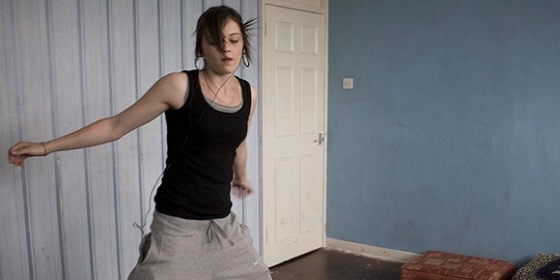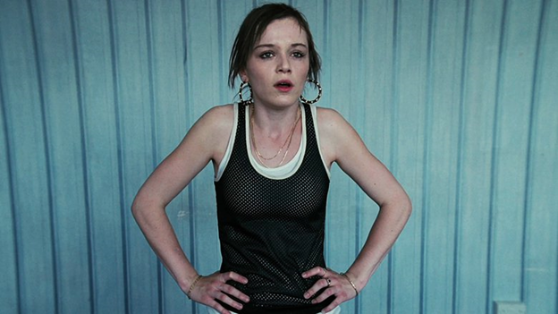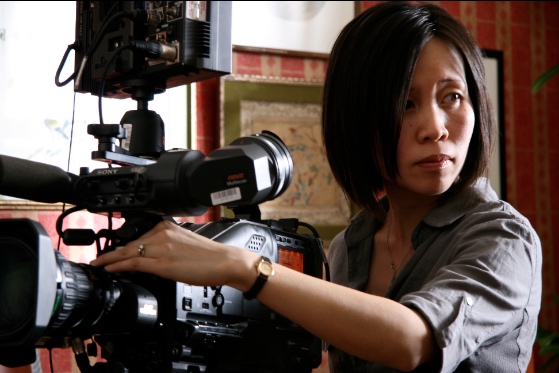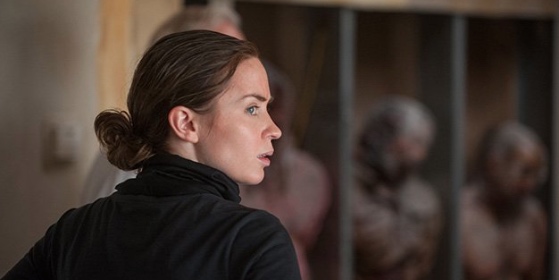
“If you could be any animal, what would you be?”
“A white tiger.” – Mia, Fish Tank
“I don’t exist. I’m nothing, nothing at all.” – Sandra, Two Days One Night
Unlike most poor or working class “everyman” characters, the body labouring under capitalism’s long shadow in Andrea Arnold’s Fish Tank (2009) and the Dardenne brothers’ Two Days One Night (2014) is female: an unsmiling young woman with dark-circled eyes, brown hair pulled back in a messy ponytail, tensed shoulders poking out from a tank top. Although the films’ heroines are separated by nationality and roughly fifteen years in age, their physical similarities and mutually grim expressions convey the collective emotional toll of economic survival. Backed into dreadful financial corners, both protagonists struggle to salvage some measure of free will. Driven by desperation, their (re)actions are often drastic and always presume the risk of humiliation, violence, loss or exile.
Fish Tank’s Mia (Katie Jarvis) is an aspiring fifteen-year-old dancer living with her single mother and younger sister in an East London public housing estate, facing transfer to a “pupil referral unit” as a result of frequent outbursts of violent rage. Two Days One Night’s Sandra (Marion Cotillard)—a young Belgian parent and factory worker on mental health leave, desperate to hold onto her job—could easily be a future incarnation of Mia, whose teenage dreams and fury at her circumstances have collapsed inward to become depression, anxiety and self-loathing.
The violence of poverty permeates both films. In Fish Tank, it lashes out as unpredictably as Mia’s temper—“Can you give Keeley a message for me?” she shouts at her friend’s father in an early scene “Tell her I think her old man’s a cunt!” Minutes later, Mia head-butts Keeley in the face after finding her practicing dance moves with a new group of girls in a parking lot near the council estate. Later, Mia spots an old mare chained to a cement block next to a cluster of caravans—grimly evocative of England’s feudal history—and tries unsuccessfully to set her free. Instead she is caught, physically restrained and groped by two young men, and barely manages to get away by kicking and screaming. Mia’s mother’s new boyfriend Conor (Michael Fassbender) seems paternally supportive of Mia’s dance ambitions—even loaning her his video camera to record an audition tape—but as the film progresses, Conor lavishes increasingly inappropriate and predatory attention on the teen, culminating in a statutory rape late one evening on the couch in Mia’s family’s apartment. The following morning Conor dumps Mia’s mother and returns to his secret wife and daughter and comfortable two-storey home, confident in his impunity. Deeply shaken by this betrayal, Mia shows up to her audition to perform the hip-hop routine she’s been practicing non-stop, only to realize the venue is looking to hire erotic dancers. One by one, opportunities and allies crumble into dust, emphasising Mia’s vulnerability and privation.

While Mia’s poverty is firmly established, Sandra’s financial insecurity hovers threateningly at the perimeter of each scene like an oncoming panic attack, eroding her self-esteem and casting doubt on every choice. At the outset of the film, she learns she’s been laid off from her job at a solar panel factory following a vote among her co-workers, who were forced to choose between her salary and their one thousand euro bonuses. The news depletes her, pulling her back into a receding depression. “How will we pay our mortgage?” her husband Manu asks. “We’ll go back on social housing,” she replies, as an anti-anxiety pill falls from her trembling hand.
A close friend and co-worker convinces the manager to hold a second vote, giving Sandra the weekend to try to convince her sixteen colleagues to change their minds. The ensuing scenes are a cross between Twelve Angry Men and Waiting for Godot, as Sandra tracks down each co-worker individually and presents her case, often using the exact same words and hearing the same responses. A damning portrait emerges of the humiliation, tedium and isolation workers must endure under late capitalism.
As Sandra climbs apartment complex stairs, rides the bus, walks down city streets and crosses suburban traffic islands, the camera stalks her—sometimes from across the street, sometimes right behind or beside her. These shots are very similar to those of Mia stomping around the council estate—in and out of her own apartment and the abandoned one she dances in—or catching a bus downtown to the internet café to study dance videos on YouTube. The effect is reminiscent of a horror film, amplifying the sense of dread and the urgency of the heroines’ movements as poverty nips at their heels. But unlike a horror movie, the main driving force behind Sandra and Mia’s struggle for survival is their anger.
Reflected in Mia’s impulsive aggression and perpetually raw nerves are both the no-future nihilism of adolescence and the clear-eyed frustration of her socioeconomic class in the face of scant prospects and no material assets. Nearly every conversation with her mother and sister ends with Mia screaming and storming out. After Conor abandons her family, Mia breaks into his comfortably middle-class house when no one is home, discovers he has a daughter and promptly pees on the carpet. She then briefly kidnaps Conor’s little girl and almost accidentally drowns her in a river before returning the child to her home.
Unsurprisingly, Mia’s hot-headed retaliations are often met with the swift, harsh punishments reserved for those living in poverty. Following the head-butting incident, social services decide to send her to a referral unit at the end of the summer, essentially streaming her out of a viable education; Conor’s response to Mia’s revenge reveals a similar perception of her worth—he chases her down, slaps her face and walks away without speaking. At the same time, Mia’s outwardly directed rage serves as a survival tactic, sustaining her through hours of solitary dance practice, freeing her from assault by the two young men in the lot, and encouraging her to take up space—say, by taking a piss in a predator’s homey living room—in a world that seeks to discard her.

Sandra’s anger is less immediately apparent. The opening scene of Two Days, One Night shows her asleep on the sofa in the middle of the day, slow to awaken to the sound of her cell phone. She pulls a pie from the oven as she learns that she’s being laid off from her job, tearfully tells herself “you mustn’t cry,” then rushes to the bathroom to swallow some anti-anxiety medication. Faced with the obviously unjust actions of her employers, Sandra’s outrage is muted, distorted by dread, self-recrimination and exhaustion, and frequently expressed through tears. Unlike Mia’s brawling, these minimally disruptive manifestations of anger seem comfortably akin to the docility society demands of women. Similarly, Sandra’s constant anxiety about sliding back into abject poverty reflects the convenient disempowerment of working-class people. Perpetually looking over their shoulders and scrambling to stay on firm ground, they are less able to lash out against the systems that oppress them.
However, it would be a mistake to interpret Sandra’s despair as meekness. In taking a mental health leave for her depression she has already committed a precarious act of self-preservation and resistance against a system that insists on worker productivity at any cost. Her decision to confront her co-workers and attempt to change their vote is equally taboo, breaking down the barriers of worker isolation and alienation in favour of solidarity and collective action. In a rare moment of unfiltered indignation, she says to a male co-worker and his wife, who is on welfare, “It’s disgusting to force you to choose, I know.” The risks of such defiance are great. Sandra is subjected to repeated humiliations—in one instance, a formerly friendly co-worker pretends she isn’t home, whispering excuses that her daughter repeats through their apartment intercom. “I can hear you, Nadine,” Sandra pleads. “Why won’t you speak to me?” Her sense of exile increases after witnessing several colleagues’ violent reactions. A co-worker named Anne’s husband screams at Sandra and jerks his wife back inside their home, where a loud argument ensues. A young man punches his father in the face, knocking him unconscious, for considering switching his vote. Sandra retreats to her bed after this incident, whispering, “I feel so alone.” For both Sandra and Mia, there are moments when it’s impossible to judge whether the cost of expressing or suppressing their anger will be greater. Ultimately, even their most dangerous actions reflect their mutual desire to evade the awful injustices of late capitalism and shed their anger.
Deep in their bones, Mia and Sandra seem equally attuned to the futility of their rage and their struggles.
The theme of escape features prominently in both narratives. Scenes featuring music and road trips provide rare glimpses of the potential for happiness in both protagonists’ lives. Conor’s car may be his most appealing feature, facilitating freedom of movement and representing access to alternate realities. During a road trip to the country, Mia’s face becomes tranquil in the backseat with the window down, while her sister jokes around with Conor and their mother and Bobby Womack’s rendition of “California Dreaming” plays on the stereo. “You like rock music?” Sandra asks her co-worker Anne, as Manu drives them to the home of the final person on her list. It’s late in the evening, and Anne has decided to leave her husband following the altercation with Sandra earlier in the day. When a classic rock song comes on, the three new friends smile and join in with the chorus.
But these moments of peace are fleeting—the filmmakers are too aware of capitalism’s reach to suggest that their heroines could successfully escape its jaws. Deep in their bones, Mia and Sandra seem equally attuned to the futility of their rage and their struggles. Returning home toward the end of the film after her useless audition, Mia sits down and sobs for the first time in the film; she’s learned that that the elderly horse she tried to rescue has been killed because, as a boy in the caravan yard tells her, “She was sixteen years old, it was her time.” After witnessing the fight between father and son, Sandra asks Manu, “Even if I am taken back, those who lost their bonuses, how will they look at me? How will I deal with them all day?” Later that afternoon, after two more disheartening encounters, she carefully makes her children’s beds and swallows an entire package of Xanax. Her attempt to end her life is interrupted by Anne’s arrival and her announcement that she’s leaving her husband and will vote for Sandra. After a trip to the hospital Sandra manages to visit almost all of her remaining colleagues. In the end, however, the vote falls one short of the majority required to save her job.
What do you do with the knowledge that a material escape from economic injustice is impossible except through death? Sandra draws significant strength from Manu, along with those colleagues who are willing to stand with her in solidarity. After the failed vote, her boss pulls her aside with a surprising offer: he proposes not to renew the contract of a new employee named Alphonse at the end of its term so that he can reinstate Sandra’s job without cutting anyone’s bonuses. Alphonse is likely the poorest employee at the factory, a young immigrant who voted for Sandra despite his precarious employment status. Sandra rejects the offer, embarking on a kind of spiritual escape, a deeply personal triumph predicated on a sense of collective belonging and responsibility.
Mia, on the other hand, has no one she can fully trust or turn to for support. The contrast between Manu’s patient, tireless devotion and Conor’s patient, cunning manipulation is especially striking, and perhaps indicative of the fact that Two Days One Night was written and directed by men and Fish Tank was not. In light of her youth and isolation, self-preservation is Mia’s sole moral responsibility. In the final scenes, when the mild-natured brother of the boys who attacked her fixes up an old car and offers Mia a lift to Wales where he “knows some people,” her decision to go with him and avoid the referral unit can also be viewed as a spiritual victory.
The options available to Mia and Sandra are so severely circumscribed by their limited economic power that any claim to agency risks a dire outcome: Mia faces bleak prospects as a teenager far from home without a high school education, and Sandra will likely have to contend with working for an equally exploitative employer or losing her home. Though uncompromising, these portraits of class segregation and worker disenfranchisement are buoyed by an idealism that encourages an empathetic, non-judgemental understanding of the characters’ responses to their circumstances and the risks they are willing to take. This idealism is reflected in the films’ shared aesthetic of bleak optimism: the gentle, sunny summer days in which the tense narratives play out, the feminine frivolities—Sandra’s bright pink tank top, Mia’s delicate gold chains—that resist the humdrum violence of the struggle to survive. In their final scenes, Mia and Sandra are setting off down new paths, having rejected the unbearable certainty of loss of self in favour of undetermined potential. “Don’t forget to text me, you skank! Say hello to the Welsh!” Mia hears her sister shout as the car pulls away from the council estate. Walking away from the factory, Sandra calls her husband. “Yes, it’s going to be tough but I’ll start searching today,” she says, smiling. “We put up a good fight. I’m happy.”





